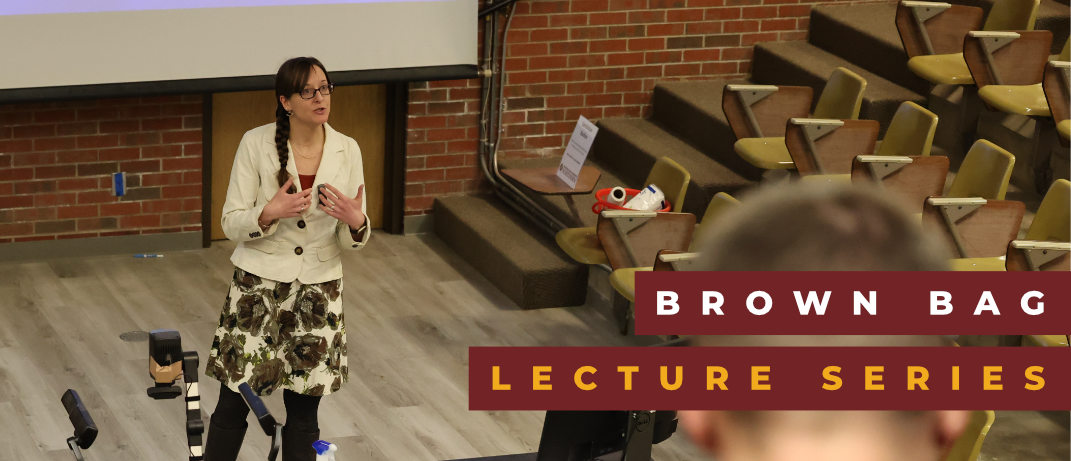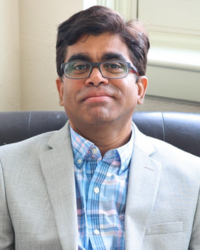
Sponsored by MSUN's Office of the Provost and organized by the Instruction, Research, & Faculty Development committee, along with the Office of Teaching & Learning Excellence
RSVP
Seating is freely available but RSVPs are appreciated, and a sack lunch will be reserved for those who RSVP. Please complete the RSVP form here. Contact Jason Geer with questions or cancellations.
Brown Bag Lectures allow faculty across all disciplines at MSU-Northern to showcase their work and to build a sense of community inquiry and interest around that work. Campus and community members are welcome to attend! View our Archive Brown Bag Lecture Series page here.
Presentations will last about 1 hour and are located in either Hagener Science Center 101 ("The Pit") or Hensler Auditorium (in the Applied Tech Center/ATC). Printable campus map
Upcoming Lecture
|
|
Thursday, March 12, 2026 — 12pm - 1pm in ATC Hensler Auditorium Presenter: Dr. Praveen K. Dubey — Assistant Professor of Education/Director of Clinical Experience and Partnerships Lecture: Teachers' Pathways to the Profession and Their Attitude Towards Diverse Classrooms Summary: Two trends are dominating K-12 education in the United States: more individuals are pivoting into teaching careers from other professions, and classrooms are becoming more diverse. Structural equation modeling was applied to the data from the 2018 Teaching and Learning International Survey. The results revealed a significant relationship between teachers’ career-choice (first or second career teachers) and their attitudes towards diverse multicultural classrooms that has wider important implications for teacher recruitment and training. The opinions and attitudes of second career teachers regarding the teaching profession indicated differences regarding the teaching profession compared to first career teachers. Female teachers rated job stability, a steady career path, and a consistent schedule as more important attributes than compared to male teachers. Additionally, female teachers' coping mechanisms for teaching diverse classrooms were believed to be better than male teachers’. Bio: Dr. Praveen Dubey conducts research in the areas of Multicultural Education, Diversity, Equity, & Inclusivity, Leadership and Change, Technology in Education (Digital Equity), STEM education, Immigrant Education, Comparative and International Education, Teacher Quality, and Teacher Choice for diverse classrooms. Dr. Dubey uses the statistical tools of Structural Education Modeling (SEM), Mediation & Moderation, and R programming in his research to address the improvement of learning experiences for diverse, immigrant/refugee, and minority students. Dr. Dubey has presented research papers at several national research conferences, such as AERA and UCIE. |
 |
Wednesday, February 11, 2026 — 12pm - 1pm in ATC Hensler Auditorium Presenter: Jeremy Siemens, PE, PLS — Associate Professor in Civil Engineering Technology Lecture: Engineering Concepts in Education Summary: Attend an informative presentation that delves into the effective integration of fundamental engineering concepts into educational programs for students at MSU-Northern. The presentation will introduce attendees to key topics that engineering students encounter during their undergraduate studies. While these topics are inherently relevant to engineers, they also possess metaphorical significance in other educational domains. No prior mathematical knowledge is required. Bio: Jeremy Siemens is an Associate Professor in the Civil Engineering Technology program at MSU-Northern. He graduated from Montana State University-Bozeman with a BS in Construction Engineering Technology in 1994. Upon graduation, Jeremy began working as an engineer for Milk River Engineering, Inc. He obtained his license as a Professional Engineer in Montana in 1998. In 2001, he was afforded an opportunity to teach at MSU-Northern part time in the CET program, and he has been teaching full time since 2004. In 2008, Jeremy earned a Masters Degree in Civil Engineering from the University of Washington as well as a Professional Surveyor’s license. He currently provides engineering and surveying services for Siemens Engineering Company and enjoys bringing his professional experience back into the classroom. He maintains professional memberships in the Montana Chapter of the American Society of Civil Engineers (ASCE), Engineers Without Borders (EWB) and Montana Association of Registered Land Surveyors (MARLS). |
Information for presenters
Please see our presenter guidelines. If you have questions or would like to present, please contact Jason Geer.






